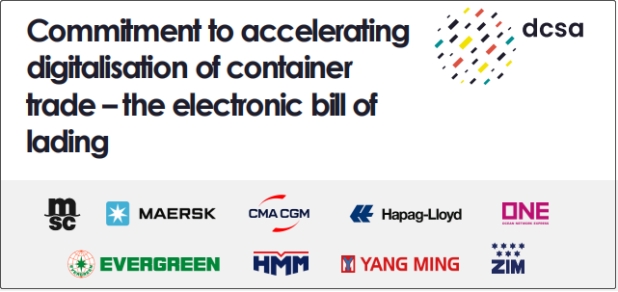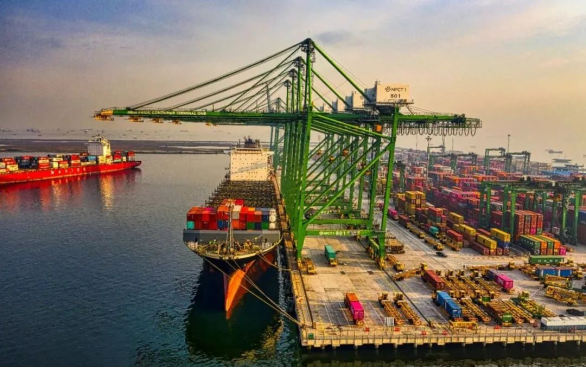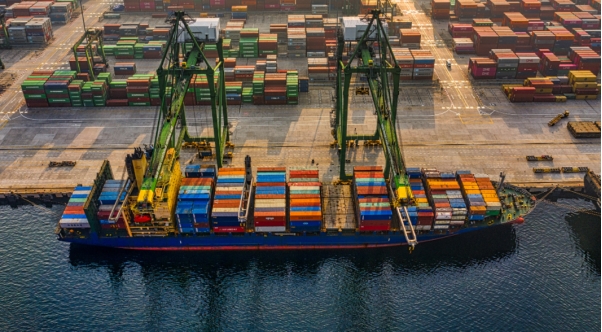The Digital Container Shipping Association (DCSA) announced yesterday that its nine shipping line members have signed a commitment to convert 50 per cent of their original paper bills of lading to digital electronic bills of lading over the next five years and to fully adopt electronic bills of Lading (eBL) by 2030.
DCSA members include MSC, Maersk, CMA Cma, Haberot, ONE, Eva, Yang Ming, HMM and Estar.

DCSA said in its announcement that the use of electronic bills of lading will help transform the customer experience, improve sustainability, and accelerate the digitization of shipping.
Moving away from physical paper bills of lading could save $6.5 billion in direct costs for all stakeholders in the maritime supply chain, including customers, banks, customs/government authorities, Marine service providers, and generate an increase in global trade of $3 billion to $40 billion per year.
The Bill of lading is one of the most important trade documents in container transport. It serves as a certificate of ownership, a receipt for shipment and a record of agreed terms and conditions. Shipping companies issue about 45 million bills of lading each year. In 2021, only 1.2 percent of these bills of lading will be electronic.
"The digitalization of international trade has enormous potential for the world economy," said Thomas Bagge, CEO of DCSA. This heralds the beginning of a new era in container transport as the bulk industry transitions to scale automation and completely paperless trade. Digitizing bills of lading has the power to transform international trade, which requires the cooperation of all stakeholders."
Soren Toft, CEO of MSC, who signed the pledge, said: "It's great that shipping companies are taking a big step towards paperless trade. Our industry needs to accelerate digitization to help make shipping safer and more efficient and provide a better experience for customers. In addition, achieving 100 percent electronic bill of Lading (eBL) will help achieve our net zero emissions goal."

Maersk CEO Vincent Clerc said: "This is an important step in creating a digital standard for one of the most costly and troublesome components in the shipping industry. A fully digital bill of lading can provide a more seamless customer experience throughout the supply chain and will also help reduce time and costs. "The need to digitise logistics is urgent and the industry needs to accelerate the process."
Olivier Nivoix, Executive Vice President of Shipping, CMA Cma CMA Group, said: "The 100 percent electronic Bill of Lading (eBL) goal is an important milestone for the shipping industry, paving the way for the digitalization of the entire value chain. This will help reduce delivery times and costs, improve customer satisfaction and achieve corporate social responsibility goals."
Rolf Habben Jansen, CEO of Habblloyd: "Since last year, we have been offering our customers electronic bills of lading to simplify document processing for all stakeholders. Our customer feedback has been very positive. The goal of achieving 100% electronic bills of lading by 2030 is an important part of digitizing the global supply chain and requires a concerted effort by the industry."
Jeremy Nixon, CEO of ONE: "With digitisation moving at an ever faster pace, it is important that the maritime industry continues to evolve and adapt by adopting new global standards and transaction efficiencies. ONE is excited to be a key player in this and to deliver an

Zheng Zhenmao, chairman of Yangming Shipping: "The digital bill of lading is an inevitable trend and will undoubtedly bring benefits to the supply chain. However, this transition requires the support of all stakeholders and liner operators."
Kim Kyung Bae, HMM President and CEO: "We are delighted to join this collaborative effort on the maritime industry's digital path. The introduction of electronic bills of lading will be an important milestone in improving efficiency, reducing costs and enhancing the security of transport services. HMM will continue to work with all industry stakeholders to drive the digitization process."
Eli Glickman, President and CEO of ZIM: "As an innovation-driven company, we are proud to be the first to introduce electronic bills of lading back in 2017. We've come a long way since then, digitizing documents for our customers in many countries."
The Digital Container Shipping Association (DCSA) was founded in March 2019 as a neutral non-profit organization. It aims to develop a common digital standard, realize the digitization and standardization of container shipping industry, and lead the industry to systematic cooperation. The goal is to enable customers to experience more transparent, reliable, user-friendly, safe and environmentally friendly transportation solutions in the container market.